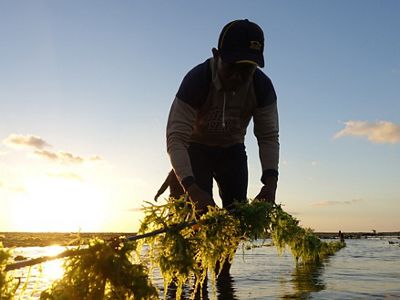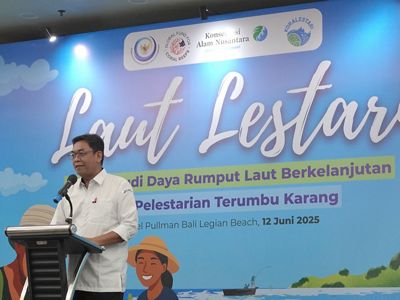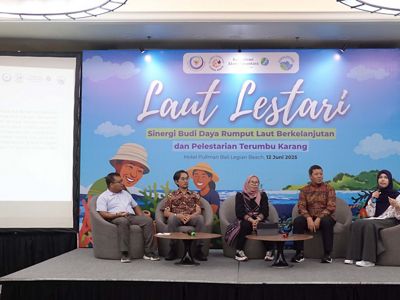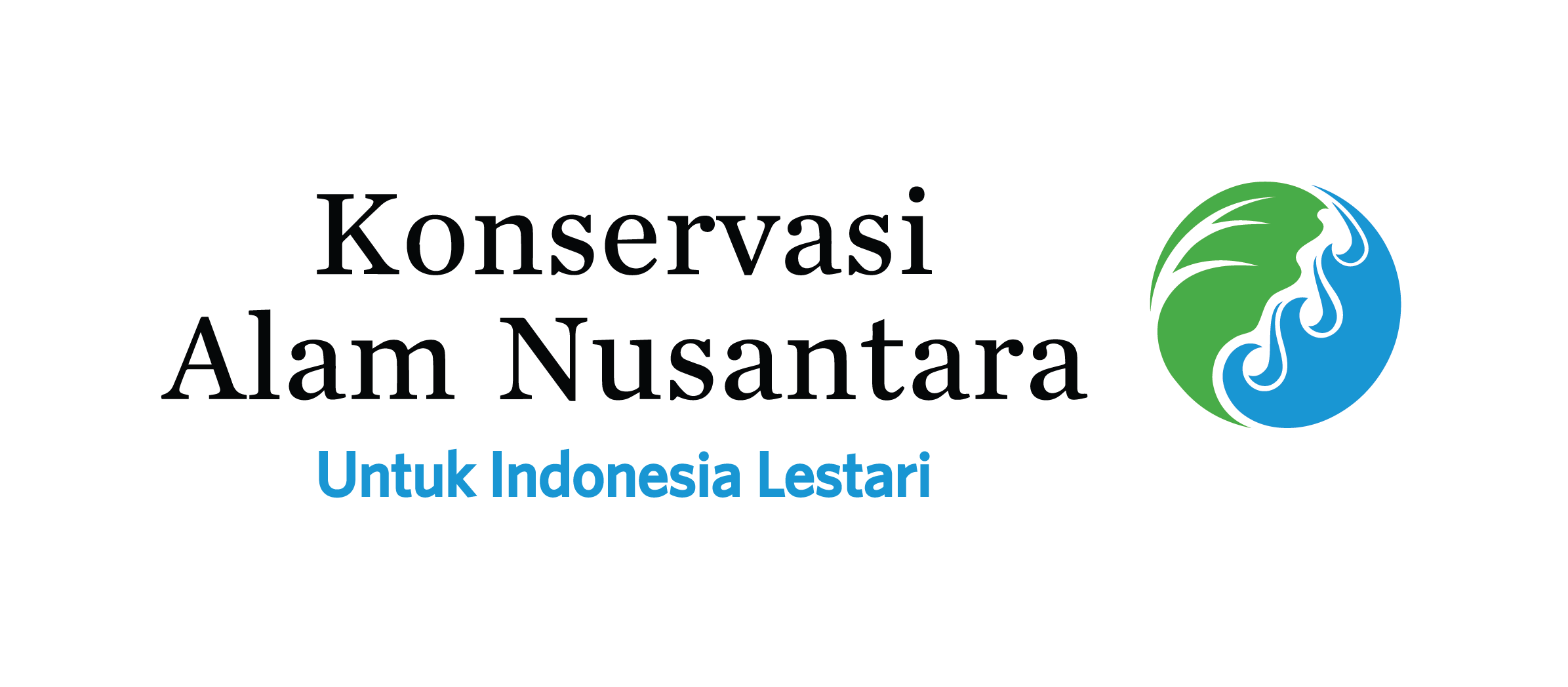
Media Contacts
-
Adia Puja Pradana
Communications Specialist Ocean Program YKAN
Yayasan Konservasi Alam Nusantara
Email: adia.pradana@ykan.or.id
Indonesia is one of the largest seaweed producers in the world. In 2022, Indonesia secured the second position globally in seaweed production, with a total output of approximately 11.3 million wet tons (KKP, 2022). Seaweed holds great potential to strengthen the sustainable blue economy.
The success of seaweed cultivation in Indonesia is supported by several factors, including a suitable tropical climate and extensive coastal areas that are capable of supporting both large- and small-scale seaweed farming. However, the development of the seaweed sector in Indonesia also faces several challenges that hinder the optimization of its potential. Forums for knowledge sharing and synergy among stakeholders are crucial to find joint solutions.

The Yayasan Konservasi Alam Nusantara (YKAN), in collaboration with the National Marine Conservation Area Agency (BKKPN) Kupang and the Marine and Fisheries Office (DKP) of East Nusa Tenggara Province, initiated discussions and seminars themed 'Synergy for Sustainable Seaweed Cultivation and Coral Reef Conservation.' These events took place in Bali on June 11–12, 2025, as part of the Koralestari Program. Government representatives, researchers, academics, NGOs, and seaweed practitioners all attended this forum.
Seaweed farming, coral reefs, seagrass beds, mangroves, and marine tourism activities exist within a connected ecosystem. Human activities such as coastal development, destructive fishing, and unsustainable tourism have long exerted pressure, impacting seaweed growth and coral reef health. It is crucial to develop seaweed sustainably, meaning that the production process must consider ecological aspects to ensure sustainable output.
“Seagrass beds, mangroves, and coral reefs are vital coastal habitats essential for seaweed survival. Many seaweed farmers are unaware of this and tend to disregard these ecosystems. Continuous education for seaweed farmers on conserving these three ecosystems is essential,” explained Imam Fauzi, Head of BKKPN Kupang.
Imam added that YKAN and partners have implemented good practices in Oelolot and Mbueain villages in Rote Ndao Regency. “There, seaweed farmers receive guidance to preserve seagrass beds, mangroves, and coral reefs. Maintaining these ecosystems accelerates seaweed reproduction and maximizes yields,” Imam elaborated.

The availability of high-quality seedlings also supports sustainable seaweed farming. “Seaweed seedlings should consider local geographical aspects and potential. Establishing seedling nurseries is necessary to ensure seed availability, using up to 20% of harvested seaweed as seed sources. Tissue culture and spore utilization can also be employed for generative seed development,” explained Petrus Rani Pong Masak from the National Research and Innovation Agency (BRIN).
Nurseries ensure seedling availability under normal conditions and during emergencies like natural disasters. “After Cyclone Seroja in 2021, seaweed seed scarcity occurred. Thankfully, the nursery developed with YKAN helped address this shortage in nearby villages,” said Albert Dethan from Pelita Kasih Foundation, Oelolot Village, Rote Ndao Regency.
Another issue highlighted was seaweed diseases, such as ice-ice disease. “Primary causes are unsupportive environmental factors like excessive light, temperature, salinity, and currents. Secondary causes include microorganism infections or pollution leading to seaweed stress,” explained Wilson Lodewyk Tisera from Artha Wacana Christian University, Kupang.

Efforts to combat these issues include crop rotation to break disease cycles, trialing disease-resistant seaweed varieties, and regularly evaluating seasonal calendars to identify optimal farming times and disease prevention strategies.
Weaving Sustainability
Scientific and empirical aspects support sustainable seaweed farming, as outlined in YKAN's Best Management Practices (BMP). Developed with farmers and research partners, this concept has been piloted in Oelolot and Mbueain villages in Rote Ndao Regency.
“BMP is a comprehensive sustainable seaweed cultivation model covering nursery modeling, superior seed selection, eco-friendly farming site selection, post-harvest drying according to Indonesian National Standards, and connecting environmentally conscious markets. This model has been replicated in partner villages in Rote Ndao and Sabu Raijua regencies,” explained Muhammad Zia Ul Haq, Sawu Sea Program Manager at YKAN.

YKAN focuses on capacity building for community economic institutions and women's groups. Women play crucial roles across seaweed farming, from seeding, cultivation, processing, and distribution, to marketing, contributing both technically and creatively. "Women dominate seaweed farming in many East Nusa Tenggara villages. They are vital for sustainability. We collaborate with organizations like YKAN to enhance their skills, including processing seaweed into products like snacks or syrups, while incorporating conservation elements," stated Sulastri Rasyid, Head of DKP East Nusa Tenggara.
Maria Gigih Setiarti from Sambung Asa added, “Women’s contributions are often undocumented and under-publicised despite their importance. Sharing inspiring stories of women in seaweed farming can motivate others.”
Seaweed farming development cannot be separated from technological innovations that add value. Diversifying seaweed-based products—ranging from food, medicine, and agriculture, to crafts—needs continuous improvement. Private sector involvement is crucial. “Local seaweed product diversification strengthens regional economic independence. These products can be developed in response to market demand and environmental considerations. Collaborations with the private sector are essential, alongside supportive policies and regulations to grow seaweed into a strategic industry,” said Boedi Sardjana Julianto, Director of PT Jaringan Sumber Daya.

Sustaining Indonesia’s seaweed sector requires strong upstream support, robust ecosystems, and multi-stakeholder collaboration between government, private sectors, academics, NGOs, and communities. “YKAN supports stakeholder collaboration in Indonesia’s seaweed sector. With stronger synergy, we hope the seaweed industry grows sustainably, supporting community welfare and marine ecosystem preservation,” concluded Kiki Anggraini, YKAN’s Senior Blue Economy Manager.
About Koralestari
Koralestari aims to address funding gaps related to coral reef conservation and restoration through innovative financing schemes and investments in reef-friendly enterprises. These solutions cover blue carbon, coral reef insurance, self-financing marine conservation areas via BLUD, sustainable commodity development, and community-based funding facilities. This program will run from 2024 to 2029 in the Sawu Sea (East Nusa Tenggara), Berau (East Kalimantan), and Lingga (Riau Islands).
Yayasan Konservasi Alam Nusantara (YKAN) is a scientific-based non-profit organization that has been present in Indonesia since 2014. With the mission of protecting lands and waters as life support systems, we provide innovative solutions to realize the harmony of nature and humans through effective natural resource management, prioritizing a non-confrontational approach, and building a network of partnerships with all stakeholders for a sustainable Indonesia. For more information, visit ykan.or.id.

